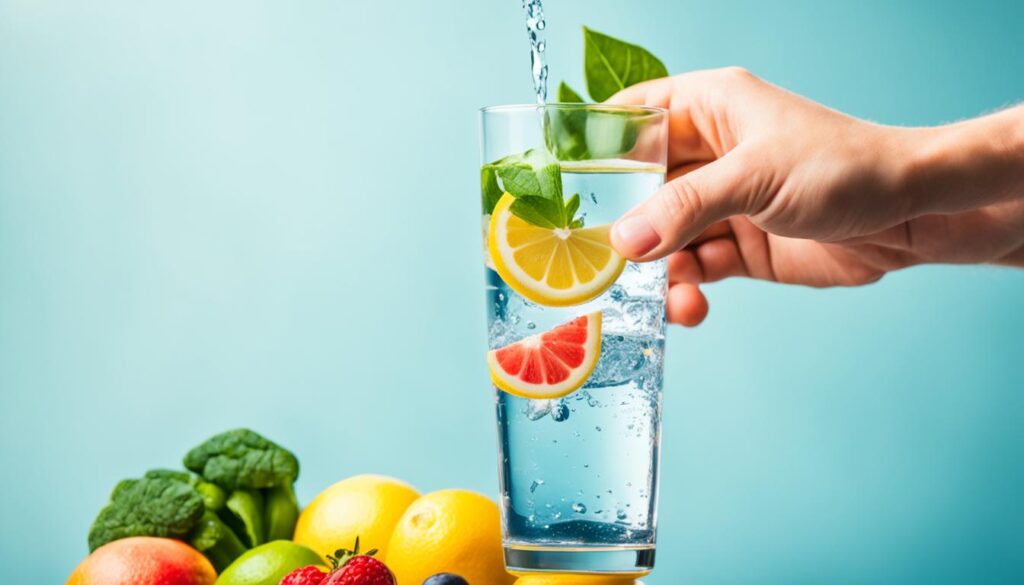Welcome to our guide on water fasting. It’s a top health and fitness trend worldwide. By drinking only water at times, it helps with health, weight, and body functions. We’ll cover its history, science, and tips for starting safely and well.
Key Takeaways
- Water fasting is a method where participants refrain from eating and consume only water.
- Common fasting durations vary widely; some engage in 16-24-hour fasts, while others fast for several days.
- Scientific studies suggest benefits like weight loss, reduced inflammation, and enhanced cellular repair.
- Proper preparation, including consulting healthcare professionals, is essential for safe fasting.
- Listening to your body and maintaining hydration are crucial during the fasting period.
What is Water Fasting?
Water fasting means not eating or drinking anything except water. It’s important to know the basics and benefits before starting. This ensures a healthy experience with water fasting.
Definition and Basics
Water fasting means drinking only water for a certain time. The time can be short, like a day, or longer, like 40 days. It’s similar to other fasting methods, like the 16/8 or 5:2 diets, but focuses on when to eat, not what.
Intermittent fasting has many health benefits.
Historical Background
Water fasting has a long history, tied to religious and spiritual practices. For years, it was used to cleanse the body and mind. Now, science is finding out how it can improve health, like boosting energy and brain function.
Common Patterns and Durations
Choosing the right fasting duration is key. Fast times can be from one day to weeks or more. Beginners should start with a 24-hour fast and then increase the time.
- 24-hour fasts: Great for beginners.
- 5-day fasts: Good for deeper health benefits, do it twice a year.
- 40-day fasts: Do this under a doctor’s watch.
Getting ready for a fast is important. You might feel tired or have headaches at first, but these go away soon.
If you’re interested in learning more about fasting, check out different methods and their benefits.
The Science Behind Water Fasting
Water fasting is more than just a way to lose weight. It’s a practice that taps into the body’s deep science. It helps with autophagy, ketosis, and cellular repair. Let’s explore these benefits.
Autophagy: The Body’s Cleanup Process
Autophagy is a key process that happens when we fast. It’s like a cleanup crew for our cells. They remove damaged cells and make new, healthy ones. This process can slow down aging and improve cell function.
It’s a big reason why Water Fasting Results are positive. Regular fasting can boost autophagy.
Ketosis: Switching to Fat for Fuel
Water fasting makes our body switch from glucose to fat for energy. This is called ketosis. It produces ketones that fuel the brain and other organs well.
Regular fasting can help us burn fat, lose weight, and keep our energy up.
Cellular Repair and Regeneration
When we fast, our body uses less energy for digestion. It focuses more on repairing cells. This is thanks to more human growth hormone (HGH) and less insulin.
This helps with muscle growth and cell renewal. It also protects us from health issues by improving our repair abilities.

| Process | Benefits |
|---|---|
| Autophagy | Cellular cleanup and repair |
| Ketosis | Increased fat burning |
| HGH Increase | Muscle growth and repair |
| Insulin Level Reduction | Improved insulin sensitivity |
Benefits of Water Fasting
Water fasting has become more popular because of its health benefits. It helps with weight loss and improves how our bodies handle insulin. Let’s look at the main benefits and see how it can improve our health.
Weight Loss and Fat Burning
One key benefit of water fasting is losing weight. Our bodies start to burn fat instead of glucose when we fast. This can lead to better weight control and fat loss, making it a great choice for those wanting to lose weight.
Improved Insulin Sensitivity
Water fasting also makes our bodies more sensitive to insulin. This means our bodies use insulin better, lowering the risk of type 2 diabetes. Tips for water fasting show that it can improve glucose control and metabolic health.
Inflammation Reduction and Detoxification
Water fasting helps reduce inflammation and detoxify the body. It gives our digestive system a break, starting cell repair and lowering oxidative stress. These effects lead to better health, less chronic inflammation, and a longer life.
Preparing for Your Water Fast
Getting ready for a water fast is key to a safe and successful experience. It involves talking to healthcare experts, picking the right time, and slowly cutting down on food. These steps are crucial for Healthy Water Fasting success.
Consulting with a Healthcare Professional
It’s vital to talk to a healthcare professional before starting a water fast. This is crucial if you have health issues or take medication. A doctor can check if you’re healthy enough for fasting and help avoid health problems. If you plan a fast over three days, getting a doctor’s advice is a must.
Choosing the Right Time to Fast
Picking the best time for your water fast is important for your comfort and success. Choose a time when you’re not very active to reduce stress. Weekends or holidays are often good choices. They let you rest, avoid busy activities, and focus on Healthy Water Fasting.
Gradual Reduction in Food Intake
Start getting ready for water fasting by slowly cutting down on food. Drop sugar, processed foods, and caffeine from your diet a few days before. Try the 16:8 fasting method to ease into it. This can make the switch to full water fasting easier. Begin with a short fast of 1 to 3 days before going longer.
- Slowly eat less over a week.
- Use intermittent fasting methods.
- Stop eating caffeine, sugar, and processed foods.
- Drink 2.2 to 3 liters of water daily.
Below is a table showing different fasting methods and their benefits:
| Fasting Method | Description | Potential Benefits |
|---|---|---|
| 16:8 Intermittent Fasting | Eating within an 8-hour window, fasting for 16 hours daily. | Weight loss of 1% to 4% within weeks. |
| 5:2 Fasting | Restricting calories to 500-600 on two non-consecutive days weekly. | Reduction of body weight by more than 5% within 12 weeks. |
| Alternate-Day Fasting | Consuming 25% of daily caloric needs each fasting day, eating normally on alternate days. | Weight reduction by 3% to 7% within two to three months. |
Steps to Start Water Fasting
Starting a water fast can be empowering with the right planning and goals. Let’s look at the key steps for a safe and effective fast.
Setting Your Goals and Expectations
First, set clear and realistic goals for your water fast. Are you looking to lose weight, detox, or reset your eating habits? Knowing your goals will keep you motivated and focused. It’s important to understand that water fasting can be challenging, so setting the right expectations is key.
Planning Your Fasting Duration
The length of your fast depends on your experience and health. Beginners should start with shorter fasts and gradually increase the time as they get more comfortable. Fast times can be from 16 to 24 hours. Listen to your body and consider methods like the 16/8 or alternating fasting days for longer periods.
Hydration and Mineral Replacement
Staying hydrated is crucial during a water fast. Drink 2-3 liters of mineralized water daily to replace lost minerals. This helps with bodily functions and prevents symptoms like headaches and dizziness. Here’s a simple guide to stay hydrated and balanced:
| Aspect | Recommended Practice |
|---|---|
| Daily Water Intake | 2-3 liters of mineralized water |
| Mineral Sources | Add a pinch of Himalayan salt to water for minerals |
| Monitoring Hydration | Regularly check urine color; pale yellow indicates optimal hydration |
By following these steps, water fasting can be a rewarding practice. Setting achievable goals, planning your fast, and staying hydrated are key to success.
Best Practices During the Fast
Starting a water fast means following key guidelines for safety and success. It’s important to stick to these tips to get the best *Water Fasting Results*.
Staying Hydrated
Drinking water is key when fasting. It keeps your body working right and helps control hunger. A study in the International Journal of Food Sciences and Nutrition found that water helps you feel full, reduces hunger, and aids in losing weight. For the best tips for water fasting, think about what your body needs.

Avoiding Intense Physical Activities
Doing hard workouts can be bad during a water fast. Your body uses less energy, so avoid hard exercises to prevent feeling weak or tired. Stick to easy activities like walking or stretching. This helps you save energy and focus on the fast’s benefits.
Listening to Your Body
It’s crucial to listen to your body. If you feel very weak, dizzy, or sick, you might need to stop fasting. Everyone’s fasting experience is different. Paying attention to how you feel helps you make the right choices. Good tips for water fasting include watching how your body reacts and acting accordingly. Always put your health first.
By following these *tips for water fasting* and these practices, you can safely and effectively achieve your *water fasting results*. Remember, fasting is a personal journey. What works for one person might not work for another. Stay informed and listen to your body at every step.
Post-Fasting: Reintroducing Food
Finishing a fast is a big deal, but we must be careful when we start eating again. The time after we stop fasting is very important. It affects how we feel overall. Here’s how to ease back into our normal eating habits.
Gradual Reintroduction
Starting slow is key when you break a fast, especially if it was a long one. Begin with drinks like herbal tea or bone broth. After a few hours, you can try eating light foods like ripe fruit or a small salad. This slow approach helps our body adjust and avoids stomach upset.
Foods to Eat After Fasting
After drinking fluids again, it’s important to eat foods full of nutrients to get our energy back. Fresh fruits, vegetables, and whole grains are great choices. You can also eat lean meat, fish, or legumes to help rebuild muscle strength. For personalized advice, services like the Fasting Forward Coaching service can help.
Avoiding Processed Foods
It’s important to stay away from processed foods after fasting. These foods can cause health problems. We should eat natural, whole foods to help our body heal. By choosing whole foods, we get the nutrients we need without harmful additives.
How well our fasting and eating after it work depends on our body’s response. For help with fasting, resources like the Dry Fasting Club offer advice on strategies that work for us.
Risks and Side Effects
Water fasting can have many benefits, but it’s important to know the risks and side effects. Knowing what to expect and how to handle it can make fasting safe.
Common Symptoms and How to Manage Them
Many people feel hungry, weak, have headaches, and feel dizzy when fasting. These symptoms come from the body adjusting to not eating and can be helped with rest and staying hydrated. It’s important to drink plenty of water and use electrolyte solutions if needed.
Thinking clearly might be harder, making it tough to focus. Safe fasting means knowing these symptoms and taking steps to lessen them. This includes not doing hard activities and drinking enough water.
When to Stop and Seek Medical Advice
Water fasting can be risky, especially if symptoms get very bad and need quick medical help. Signs like feeling lost, very tired, or confused mean you should stop fasting and see a doctor right away. People with health issues or on medication should talk to their doctor before fasting. This helps avoid dehydration or problems with electrolytes.
Be careful with longer fasts or if symptoms are strong. The fasting plan should fit your health history. People with chronic illnesses, pregnant or nursing women, and those with eating disorder history should not fast or do it with a doctor’s close watch. Safe fasting means listening to your body and stopping if you feel bad.
Source Links
- Intermittent Fasting 101 — The Ultimate Beginner’s Guide
- A Beginners Guide to Fasting: Everything You Need to Know About Fasting
- Thinking Fast and Fast — A beginners guide to a 5-day Water Fast
- How to Start Fasting
- A Beginner’s Guide to Intermittent Fasting | The Pursuit | University of Michigan School of Public Health | Alternative Therapies | Dietetics | Nutrition | Obesity
- Intermittent Fasting 101: A Comprehensive Beginner’s Guide
- The Complete Intermittent Fasting Guide for Beginners
- Intermittent Fasting 101: A Beginner’s Guide and How Relentlessly Forged Can Support Your Journey
- Beginner’s Intermittent Fasting Guide: Benefits, Do’s & Don’ts
- Perform a Water Fast: Safe Guidelines for Beginners
- How to Fast in Hour, Day, and Week-Long Intervals
- How to get started with intermittent fasting? : IF 101.
- Intermittent Fasting 101: A Beginner’s Guide to Time-Restricted Eating
- Intermittent Fasting: A Safe and Effective Way to Lose Weight
- Intermittent Fasting 101 — The Ultimate Beginner’s Guide – The Garda Post
- Intermittent Fasting 101: The Complete Beginner Guide – Nutrabay Magazine
- How to Perfectly Schedule Your Meals Post-Dry Fasting
- PNC- Fasting.pptx
- What is an intermittent fasting diet?
- Intermittent Fasting FAQ




